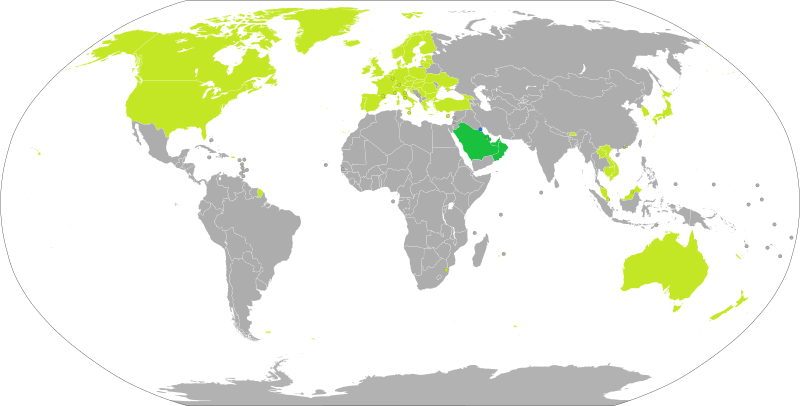| Politics of Kuwait |
|---|
 |
|
|
| Constitution |
| Monarchy |
| Government |
| Judiciary |
| Administration |
|
Foreign relations
|
| Related topics |
|
|
Under normal circumstances, visitors to Kuwait must obtain a visa unless they come from one of the visa exempt countries or countries eligible for visa on arrival/eVisa. All visitors (except Gulf Cooperation Council citizens) must hold a passport valid for 6 months.
Visa policy map

Visa exemption
Ordinary passports
Citizens of the following GCC countries do not require a visa to visit Kuwait and may use national ID Cards to enter the country for an Indefinite Period Of Stay:
As of November 2023, use of GCC ID Cards for entry has been restored for Gulf Cooperation Council (GCC) Countries.
Non-ordinary passports
In addition to GCC Countries which are already visa exempt, Holders of diplomatic, official & service passports of Albania, Algeria, Azerbaijan, Bangladesh, Bulgaria, Cambodia, Cyprus, China, Egypt, Germany, Honduras, Hungary, India, Indonesia, Ireland, Jordan, Laos, Malaysia, Malta, Mongolia, Morocco, Pakistan, Peru, Philippines, Portugal, Romania, Russia, Serbia, Singapore, South Korea, Switzerland, Tajikistan, Turkey, Ukraine, United Kingdom and Vietnam and just diplomatic passports of Armenia, Estonia, France, Greece, Iraq, Italy, Mexico, Poland, Spain and Uzbekistan do not require a visa for 30 days.
Visa on arrival/eVisa
Citizens of the following 53 countries and territories may obtain a visa valid for 3 months on arrival to Kuwait if arriving by air or they may obtain an eVisa before arrival:
|
|
A visa can also be obtained on arrival valid for one month for those holding a confirmation from a transporting carrier and are travelling for tourism purposes.
Passengers arriving by sea or land must obtain a visa in advance.
Residents of GCC countries belonging to designated professions may also obtain a visa online.
Admission Refused
 Israel Israeli nationals (including dual citizens traveling on another country's passport) are banned from entering and transiting in Kuwait. Kuwait also refuses entry to any passport with evidence of travel to Israel.
Israel Israeli nationals (including dual citizens traveling on another country's passport) are banned from entering and transiting in Kuwait. Kuwait also refuses entry to any passport with evidence of travel to Israel.
Regulations
In recent decades, Kuwait has enacted certain measures to regulate the issuance of new visas for foreign labor. For instance, workers from Georgia and Morocco are subject to heightened security when applying for entry visas, and an outright ban was imposed on the entry of domestic workers from Guinea-Bissau and Vietnam. Workers from Bangladesh and Pakistan are also scrutinized when applying for new visas. Scrutiny also includes their medical tests from GAMCA/WAFID approved medical centers. GAMCA medical fit report declares the applicant is fit to travel. So its a must to attach that medical test report with visa application. In April 2019, Kuwait added Ethiopia, Burkina Faso, Bhutan, Guinea and Guinea-Bissau to the list of restricted countries. According to Migrant Rights, the visa restrictions are put in place mainly due to the fact that these countries lack embassies and labour corporations in Kuwait. A visa restriction on nationals of Ethiopia was lifted in 2018.
After President of the United States Donald Trump's Executive Order 13769, which banned the entry of nationals from Afghanistan, Sudan, Pakistan, Iraq, Somalia, Libya, Syria, and Yemen into the United States, several Western news sites published stories claiming a similar visa ban in Kuwait. The Kuwaiti Ministry of Foreign Affairs denied that they currently ban nationals from those countries from entering Kuwait.
See also
References
- "Visa and passport". Timatic. International Air Transport Association through Emirates. Retrieved 1 April 2017.
- "Kuwait visa policy".
- "Visa and passport". Timatic. International Air Transport Association through Emirates. Retrieved 1 April 2017.
- "eVisa Application".
- "Entry requirements - Kuwait travel advice - GOV.UK". www.gov.uk. Retrieved 2018-03-19.
- "Visa information". Archived from the original on 2017-03-11. Retrieved 2023-04-02.
- "Citing Security Concerns, Kuwait Bans Entry to These Nationalities". Al Bawaba. 8 November 2018. Retrieved 8 November 2018.
- "Kuwait Re-Activates Ban on Bangladeshi Workers". Al Bawaba. 5 March 2018. Retrieved 8 November 2018.
- "Medical Test for GCC Visa". gamcamedicalstatus.org. Retrieved 8 August 2024.
- "GAMCA Medical Appointment At Approved Centres For Visa". GAMCA Medical Appointments. Retrieved 2024-09-23.
- "70% of domestic workers in Kuwait have expired contracts". 2 December 2020.
- "No Ethiopians to Kuwait - Kuwait Times". Kuwait Times. 2014-09-13. Retrieved 2018-03-19.
- "Kuwait lifts Ethiopian domestic worker ban". GulfNews. 2018-04-04. Retrieved 2021-02-07.
- "Kuwait knocks down bogus claim following Trump's latest misstep". MSNBC. Retrieved 2018-03-19.
- "KUNA : Kuwait denies reports entry visa ban of certain nationalities - Politics - 03/02/2017". www.kuna.net.kw. Retrieved 2018-03-19.
- ""سبوتنيك" الروسية: الكويت سبقت ترامب في منع دخول 5 جنسيات". Retrieved 2018-03-19.
- "Visa for Pakistani Family - No ban only "restrictions" - ARAB TIMES". ARAB TIMES. 2016-07-06. Retrieved 2017-02-08.
External links
- List of countries whose citizens can obtain Visas upon arrival at all Kuwaiti ports of entry, Embassy of the State of Kuwait - Washington, DC
- State of Kuwait Ministry of Interior e-Visa